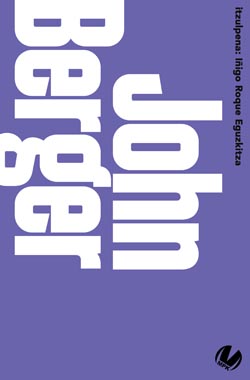
Azkenak dira
Beverlyrentzat
Mihiaren atzean,
belar-mintzairarekin
eta gatzerako grinarekin,
mihi astun eta
halere itsu baten eskua bezain
abilaren atzean,
behi osasuntsu batek
berrogeita hamar bat aldiz mamurtzen du
hausnartua berriro irentsi aurretik.
Irudi du Beverly
animaliak
emigratzen ari direla: haien Amerikak
zeruetako konstelazioak dira:
Muskerra, Lehoia, Hartz Handia,
Aharia, Zezena, Belea,
Erbia…
Beharbada zuhurrenek
hala nola agutiek
Esne Bidea hautatu dute.
Erantsi belarria haren saihetsari
eta adituko duzu
haren lau urdailetako marea.
Bigarrenak, sare tankerakoak,
konstelazio-izena dauka:
Erretikulua. Hirugarrenak,
Salterioak,
liburu tankera dauka.
Gaixo delarik
mamurtzeko gogoa galduta,
haren lau urdailak
mututzen dira erlauntza bat neguan bezala.
Urterik urtera animalia gehiagok alde egiten du.
Etxabereak eta azienden gorpuak baizik ez dira geratzen
eta azienda bizian edo hilean
ezinbestez eta ezarian
bihurtzen da haragi
“Sinetsita nago erabat posible dela
—esan zuen Iowako Unibertsitateko
Bob Bust-ek—
animalia bat berariaz
hanburgesatarako diseinatzea”.
Beste nonbait
pobreen animaliak
pobreak bezala hiltzen dira
proteina gabeziagatik.
Abereek larreetatik biltzen dituztenean
arboladiaren beroa
eta hartz-baratxuriaren arnasa beroa
eramaten dituzte ukuilu hotzetara.
Korta garbitzeko
barreiatu
behor-simaur pixka bat
minda xurgatzen baitu
minda udaberria bezain likidoa eta
berde belarkara.
Eta ongi lotu gaur gauean
azpiak egin pago-orriz
Beverly
azkenak dira eta.
Orain joanak direla
haien kemenaren falta dugu.
Zuhaitzak ibaiak
eta hodeiak ez bezala
animaliek bazeuzkaten begiak
eta haien begirada
iraupena zen.
Bazen sekulako eta betiko azeria.
Bera hiltzeko
aski zen
lipar batez egoztea
bere eternitateko
lurretik.
Euliek eta beleek
ardi hila jatean
begietatik hasita ekiten zioten.
Haatik ordurako ardia
erditua zen
bere iraupenaren axuriaz.
Zapelatzak inguruka
bil-bil egiten zuen bere denbora eternala
mendiak
bezainbat aldiz.
Gau bakartitik
egunaren behakoa zetorren,
bere animalia-adikune zuhur
noranahikoarekin.
Animaliak isurian zihoazen haien esnea bezala.
Orain joanak direla
haien kemenaren falta dugu.
“Zerrama —diotenez—
mekanika baliotsutzat
hartu behar litzateke,
haren egitekoa
txerrikumeak ekoiztea baita”.
Haatik batzuetan
esneak,
pitxar zuritik
isurtzen ari zarelarik,
gogora ekartzen dit
txakurren moldean
etxea zaintzen zuen antzara.
They Are The Last
for Beverly
Behind her tongue / with its language of grass / and passion for salt, / behind the heavy tongue / deft nevertheless / as a blind man’s hand, / a cow in good health chews / approximately fifty times / before re-swallowing the cud. // It appears the animals / Beverly / are emigrating: their America / the constellations in the sky: / Lizard, Lion, Great Bear, / Ram, Bull, Crow, / Hare... / Perhaps the more prudent / like the agouti / have chosen the milky way. // Put your ear to her flank / and you will hear / the tide of her four stomachs. / Her second, like a net, / has the name of a constellation: / Reticulum. Her third, / the Psalterium, is like / the pages of a book. // When she falls sick / and lacks the will to chew / her four stomachs fall / silent as a hive in winter. / Each year more animals depart. // Only pets and carcasses remain, / and the carcasses living or dead / are from birth / ineluctably and invisibly / turned into meat. / ‘I believe it’s completely feasible,’ / said Bob Rust / of Iowa State University, / ‘to specifically design / an animal for hamburger.’ // Elsewhere / the animals of the poor / die with the poor / from protein insufficiency. // When fetched from the pastures / the cattle bring into the cool stable / the heat of the orchard / and the hot breath of wild garlic. // To clean out the cowshed / scatter a little of / the mare’s dung / it absorbs their shit / liquid as springtime / and green with grass. // And fasten them well tonight / bed them with beech leaves / Beverly / they are the last. // Now that they have gone / it is their endurance we miss. / Unlike the tree / the river or the cloud / the animals had eyes / and their glance / was permanence. // It was the same fox for ever and ever. / To kill him / was to drag him / momentarily / from the earth / of his eternity. // Flies and crows / when devouring the dead sheep / began with the eyes. / Yet the ewe / had already lambed / her permanence. // The buzzard circled / biding his everlasting time / as repeatedly / as the mountain. // Out of the single night / came the day’s look, / with its wary animal glance / to every side. // The animals flowed like their milk. / Now that they have gone / it is their endurance we miss. // The breeding sow,’ it is said, / ‘should be thought of and treated / as a valuable piece of machinery / whose function / is to pump out baby pigs’ // Yet sometimes / when you are pouring / from the white jug, / the milk / reminds me of the geese / who like dogs / guarded the house.